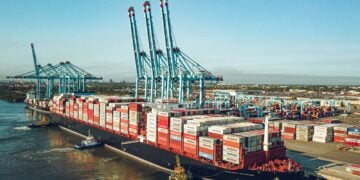The Federal government, on Wednesday, called for a collaborative effort to create a regulatory framework that empowers exporters, streamlines processes, and unlocks the full potential of Nigeria’s commodity export.
Speaking, the permanent secretary of the Federal Ministry of Industry, Trade, and Investment, Amb. Nura Rimi, at a one day stakeholders workshop, organised by the Ministry in conjunction with the Nigeria Shippers Council (NCS), titled, “Port Economic Regulation and Its Impact on Shipment of Export Commodities through Nigerian Ports,” emphasised the pivotal role of Nigerian ports in enhancing the nation’s export efficiency and competitiveness.
Rimi, who was represented by the director Commodities and export department, ministry of trade and investment, Kaura Irimiya, highlighted the vast wealth of exportable commodities in Nigeria, ranging from oil and gas to agricultural produce, and underscored the importance of efficient port operations in driving economic growth.
He said, “Our ability to efficiently export these commodities is crucial for our economic growth and international competitiveness,” he stated.
However, he noted that the smooth flow of exports heavily relies on ports functioning at their optimal capacity.
He informed that the Export Commodities Coordinating Committee (ECCC), established in 1988, played a key role in organising the workshop.
He said the ECCC was created in response to the challenges brought by the Structural Adjustment Programme (SAP), which led to the privatisation of state-owned industries and the abolition of commodity marketing boards.
He explained that this resulted in issues such as the adulteration and low-grade export commodities from Nigeria, and the country’s mounting financial obligations to International Commodity Organizations.
He added, “The ECCC was tasked with sanitising the export trade, ensuring that only commodities meeting international standards were exported, and addressing Nigeria’s financial obligations to international bodies.”
Rimi reiterated the significance of this workshop, approved by the ECCC, in gathering stakeholders from various sectors to examine the impact of port economic regulation on non-oil export commodities.
Rimi called for a collaborative effort to create a regulatory framework that empowers exporters, streamlines processes, and unlocks the full potential of Nigeria’s commodity export sector.
Speaking, the executive secretary of the NSC, Pius Akutah, highlighted the NSC’s efforts in cost moderation, setting operational standards, and mediating disputes to ensure harmony in the port sector.
He pointed out the high transport costs associated with Nigeria’s agricultural export commodities, attributing these to factors such as inefficient port operations, high cargo handling charges, inadequate infrastructure, and congestion at the ports.
“The high cost of cargo movement can be attributed to various factors including inefficient port operations, high cargo handling charges, inadequate transportation and storage infrastructure, long delays and congestion at the ports, high fuel costs, and inadequate competition in the transport sector,” Akutah explained.
He noted that these factors contribute significantly to the non-competitiveness of Nigerian exports in the global market.
Speaking during his goodwill message the President Shippers Association of Lagos (SAL) Mr. Leo Ogamba expressed optimism that the workshop would pave the way for improved communication and collaboration among regulators, port operators, shippers, and exporters.





